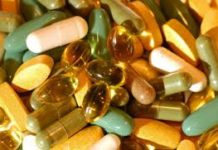Vitamin B-12, also referred to as cobalamin and cyanocobalamin, is a water-soluble compound of the B vitamin family with an unique difference — unlike other B-vitamins that must be replaced daily, vitamin B12 can be stored for long periods in the liver and kidneys.
Vitamin B12 is a particularly important coenzyme that is required for the proper synthesis of DNA which controls the healthy formation of new cells throughout the body. B12 also supports the action of vitamin C, and is necessary for the proper digestion and absorption of foods, for protein synthesis, and for the normal metabolism of carbohydrates and fats. Additionally, vitamin B12 prevents nerve damage by contributing to the formation of the myelin sheath that insulates nerve cells. B12 also maintains fertility, and helps promotes normal growth and development in children.
A deficiency of vitamin B-12 can result in a potentially fatal form of anemia called pernicious anemia. Since vitamin B12 can be easily stored in the body, and is only required in tiny amounts, symptoms of severe deficiency usually take five years or more to appear. When symptoms do surface, usually in mid-life, it is likely that deficiency was due to digestive disorders or malabsorption rather than to poor diet. The exception to this would be strict vegetarians who do not consume any foods of animal origin, since B12 only comes from animal sources.
Due to its role in healthy cell formation, a deficiency of B12 disrupts the formation of red blood cells, leading to reduced numbers of poorly formed red cells, leading to a anemia. Symptoms of anemia include fatigue, loss of appetite, diarrhea and moodiness. B12 deficiency can lead to improper formation of nerve cells, resulting in irreversible neurological damage, with symptoms ranging from disorientation, delusions, eye disorders, dizziness, confusion and memory loss.
The RDA for vitamin B12 is 2 micrograms for adults, 2.2 micrograms for pregnant women, and 2.6 micrograms for nursing mothers. Vitamin B12 is not found in vegetables, but can be found in pork, blue cheese, clams, eggs, herring, kidney, liver, seafood, and milk.
Vitamin B12 is available in supplement. Due to poor absorption in the stomach, B12 isusually taken as a sublingual or in injection form. Supplements range in strength from 50 micrograms to 2 milligrams. There are virtually no known toxic symptoms for megadoses of vitamin B12, and any excess is simply excreted from the body.













